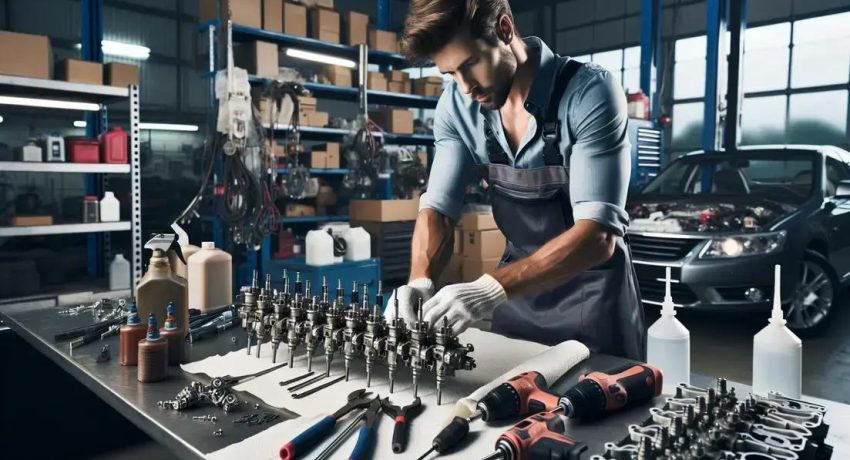Cleaning fuel injectors involves using methods like ultrasonic cleaning, fuel additives, or professional services to remove deposits, enhance engine performance, and improve fuel efficiency.
Looking to boost your car’s performance? How to clean fuel injectors is a key question for many car enthusiasts. A clean injector means better fuel efficiency and engine health, and I’m here to guide you through the process.
Table of Contents
ToggleUnderstanding fuel injector cleaning methods

Understanding fuel injector cleaning methods is essential for maintaining your vehicle’s performance. Fuel injectors play a crucial role in ensuring proper fuel delivery to the engine, and contaminants can hinder their efficiency.
Types of Cleaning Methods
There are several methods available for cleaning fuel injectors. Here are the most common:
- Ultrasonic Cleaning: This method uses high-frequency sound waves in a liquid solution to remove deposits from the injectors. It’s thorough and effective, especially for injectors with heavy buildup.
- Fuel Additives: Fuel injector cleaning additives can be added directly to your gas tank. These additives dissolve carbon deposits and help keep injectors clean. Regular use can prevent buildup.
- Professional Cleaning: Taking your vehicle to a mechanic for a professional cleaning service often yields the best results. Technicians use specialized equipment to clean the injectors more effectively than home methods.
When to Clean Fuel Injectors
It’s advisable to clean your fuel injectors if you notice symptoms such as rough idling, decreased fuel efficiency, or engine performance issues. Regular maintenance checks can help determine the appropriate cleaning frequency.
Step-by-step guide to cleaning fuel injectors

A step-by-step guide to cleaning fuel injectors can ensure your vehicle runs smoothly. Regular cleaning prevents clogs and maintains optimal performance. Here’s how to do it:
Step 1: Gather Materials
Before you begin, make sure you have all the necessary tools. You will need:
- Fuel injector cleaning kit
- Screwdrivers
- Safety goggles
- Gloves
- Cleaning solvent or additives
Step 2: Prepare the Vehicle
Start by parking your vehicle in a safe, well-ventilated area. Disconnect the battery to ensure safety. Make sure to wear your safety goggles and gloves.
Step 3: Access the Fuel Injectors
Locate the fuel rail, which is usually found on top of the engine. Remove any components blocking access to the injectors, such as the engine cover. Follow your vehicle’s service manual for specific instructions.
Step 4: Clean the Injectors
Using the fuel injector cleaning kit, attach the appropriate adapter to the fuel rail. Add the cleaning solvent according to package instructions. Start the engine or activate the cleaning tool, allowing the solvent to circulate through the injectors. This helps remove deposits and ensures they operate efficiently.
Step 5: Reassemble the Components
Once the cleaning is complete, turn off the engine and disconnect the cleaning kit. Reattach any components you removed to access the fuel injectors. Ensure everything is securely fastened.
Step 6: Test the Vehicle
Reconnect the battery and start the vehicle. Listen for any irregular sounds and check for leaks around the injectors. A smooth-running engine indicates successful cleaning.
Wrapping Up Fuel Injector Cleaning
Cleaning your fuel injectors is crucial for the health of your vehicle. By following the steps outlined, you can ensure that your engine runs smoothly and efficiently.
Regular maintenance, including cleaning injectors, helps prevent issues like reduced performance and poor fuel efficiency. Always refer to your vehicle’s manual for specific instructions, and if you’re not comfortable doing it yourself, consider seeking help from a professional.
Keeping your fuel injectors clean will contribute to a longer lifespan for your engine and a better driving experience overall.
FAQ – Common Questions About Cleaning Fuel Injectors
How often should I clean my fuel injectors?
It’s recommended to clean your fuel injectors every 30,000 to 60,000 miles, but regular checks can help determine the right schedule for your vehicle.
What signs indicate that my fuel injectors need cleaning?
Signs include rough idling, decreased fuel efficiency, engine misfires, and unusual engine sounds.
Can I clean fuel injectors myself?
Yes, you can clean fuel injectors yourself using a cleaning kit, but if you’re not comfortable, it’s best to hire a professional.
What products are best for cleaning fuel injectors?
Fuel injector cleaning kits and certain fuel additives are effective options for cleaning injectors.
Will cleaning my fuel injectors improve fuel efficiency?
Yes, cleaning your fuel injectors can improve fuel efficiency by ensuring that the injectors deliver fuel properly to the engine.
Is it necessary to use a professional service for cleaning fuel injectors?
While DIY methods can be effective, a professional service may provide a more thorough cleaning and is recommended if you’re experiencing significant issues.






